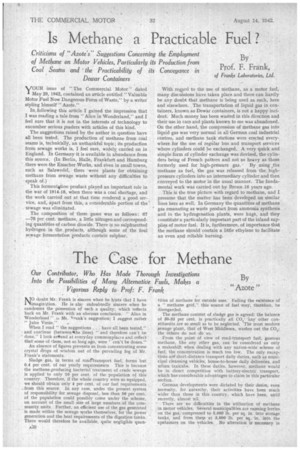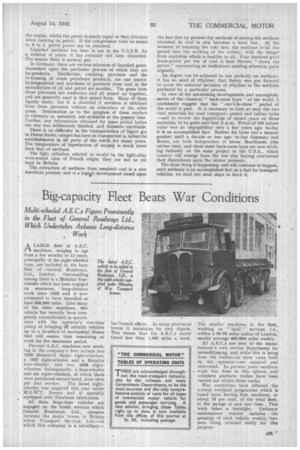The Case for Methane
Page 32

Page 33

If you've noticed an error in this article please click here to report it so we can fix it.
Our Contributor, Who Has Made Thorough Investigations Into the Possibilities of Many Alternative Fuels, Makes a Vigorous Reply to Prof: F. Frank
By " Azote "
NO doubt Mr. Frank is sincere when he hints that I have imaginAtion. He is also indoubtedly sincere when be condemns the possession of such a quality; which reflects back on Mr. Frank with an obvious conclusion. " Alice in
Wonderland " Mr. ''rank's suggestion; I suggest rather " Jules Verne." .
When I read "the suggestions . . have all been tested," and continue (betweenethe lines) " and therefore can't he done," I look argund at everyday commonplacts and reflect that some of them,•not so long ago, were '• can't be dones."
An absence of figures prevents us from Concentrating some crystal drops of wisdom out of the pervading fog of Mr. Frank's statements.
Sludge gas, in terms of roaetransport fuel, forms but 0.4 per cent, of our yearly requirements This is because the methane-producing bacterial treatment of crude Sewage is applied" to only 10 per cent, of the. population of this country. Therefore, if the whole country were so. equipped, we should obtain only 4 per cent, of our fuel requirements ,.from this source. In any case, under the present system of responsibility for sewage disposal, less than 50 per cent. of the population could possibly come under the scheme, on account of the small size of large numbers.of the community, units. Further, an efficient use of the gas generated is made within the sewage works themselves, for the power generation and the heat requirements of the digestiontanks. There would therefore be available, quite negligible quan tities of methane for outside uses. Failing the existence of a " methane grid," this source of fuel may, therefore, be disregarded.
The methane content of sludge gas is agreed: the balance of 30-33 per cent, is practically all CO,. 'any other constituents are so small as to be neglected. The most modern sewage plant, that of West Middlesex, washes out the CO2; the others do not di) so.
From the point of view of road-transport fuel, gaseous methane, like any other gas, can be considered as only a makeshift when dealing with any nation-wide' scheme of fuel; the concentration is much too low. The only exceptions ard short-distance transport daily duties, such as municipal cleansing vehicles, house-to-house daily deliveries, and urban taxicabs. In these duties, however, methane would , be in direct competition with battery-electric transport, which has considerable advantages to claim in this particular section.
German developments were dictated by their desire, even necessity, for autarchy, their activities have been much wider than those in this country, which have been, untilrecently, almost nil.
There are no difficulties in the utilization of methane in motor vehicles. Several municipalities are running lorries on the gas, compressed to 5,000 lb. per sq. in. into storage tanks, and from them at 3,000 lb. per sq._ in. into the c9ntainers on the vehicles. No alteration is necessary in the engine, whilst the power is nearly equal to that obtained when running on petrol. If the compression ratio be raised to 8 to 1, petrol power can be obtained.
Liquefied methane has been in use in the U.S.S.R. for a number of years; it has certainly not been discarded. The source there is natural gas.
In Germany, there are various mixtures of liquefied gases, dependent upon the particular process of which they are by-products. Distillation, cracking. pyrolesis and the re-forming of crude petroleum products, are one source; hydrogenation and synthesis of products from coal in the manufacture of oil and petrol are another. The gases from -these processes are numerous and all mixed up together, and are generally used in that mixed form. Many of them liquefy easily, but it is doubtful if methane is obtained from these processes without an admixture of the other gases. Information as to the progress of these matters in Germany is, naturally, not available at the present time. Further, any information obtained for some period before the war was deliberately falsified, and therefore unreliable.
There is no difficulty in the transportation of liquid gas in Dewar flasks; oxygen has been so transported in industrial establishments in all parts of the world for many years. The temperature of liquefaction of oxygei is much lower than that of methane.
The light cylinders referred to would-be the light-alloy wire-wound ones of French origin; they are not as yet legal in Britain.
The extraction of methane from unnained coal is a new American process, and is a logiwil development based upon the fact that by present-day methods of mining the methane absorbed in coal in situ becomes a total foss. At the moment of breaking the coal face, the methane is all dispersed into the working of the colliery, with the danger from explosion which is familiar to all. Four hundred good horse-power per ton of coal is here thrown " down the gutter," representing an inefficiency needing attention quite urgently.
An engine can be adjusted to run perfectly on methane: it has no need of ethylene; that theory was put forward to cover the enforced inclusion of ethylene in the methane produced by a particular process.
In siiew of the astonishing developments and accomplishments of the chemical " back-room boys " of the world. I confidently suggest that the " can't-be-done " period of the world is past. It is necessary to look at only the two vital materials for road transport—petrol and rubber tyres —and to review the happenings of recent years on these materials, to be quite sure that it is so. Petrol of 100 octane value was an impossibility only a few years ago; to-day it is an accomplished fact. Rubber for tyres was a natural product until a decade or two ago; to-day Germany and Russia, are both independent of hevea Brasiliensis (the rubber tree), and those same back-room boys are now working furiously on the same project in the U.S.A., which country will emerge from the war also having overturned their dependence upon the rubber interests.
The same thing is happening, and will continue to happen, until methane is an accomplished fact as a fuel for transport vehicles; we shall not need ships to fetch it.




















































